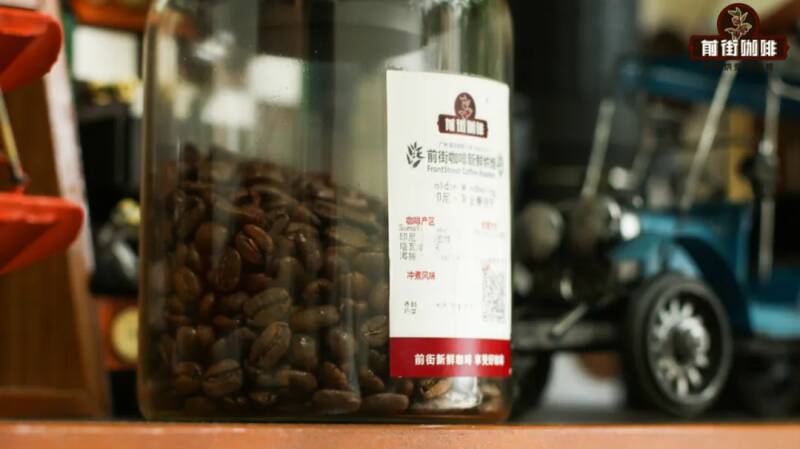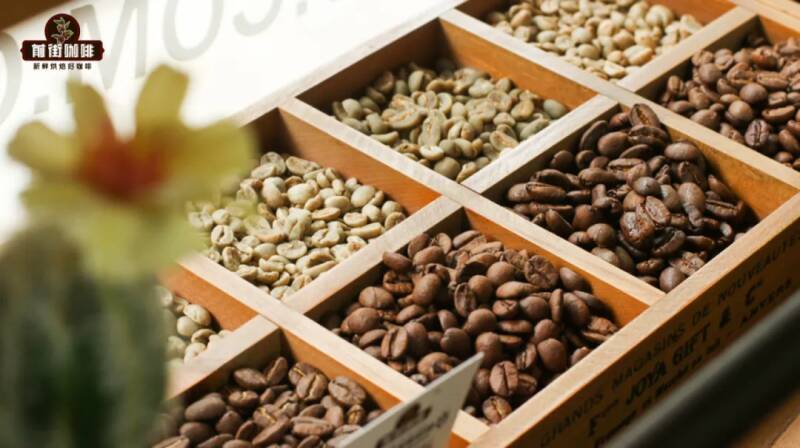Why do coffee beans produce oil? Is the oil-consuming taste of coffee an oxidation taste? What is the difference between lightly roasted coffee and deeply roasted coffee?
Two days ago, the guest friend who arrived at the store found that the Mantenin beans in the jar in the front street had obvious "oil and water", so the friend asked Qianjie: "is this jar of mantenin out of oil because it has been kept for too long?"

In fact, the oil from coffee beans is a very normal phenomenon, because the "oil" on the surface of coffee beans is essentially the water-soluble fat of beans. The reason why guests and friends ask like this is that not all roasted coffee beans will be oiled, and oily beans can be said to be relatively rare nowadays. Why? Because it has something to do with the degree of baking of beans.
What does the bean oil have to do with the degree of baking? Before the raw coffee beans are roasted, their structure is very close, and the water-soluble oil wraps the fiber matrix of the beans. When the raw coffee beans are poured into the roaster for baking, they will continue to absorb the heat provided by the roaster, and the beans will expand as the heat energy is absorbed. There is a corner of Qianjie store where coffee raw beans and cooked beans are specially placed. Guests who have noticed will find that the volume of raw coffee beans has expanded 1.5 times to 2 times after roasting mature beans. The deeper the baking, the higher the expansion.

As the volume expands, the cell wall stomata of the beans are further opened, accumulating a lot of carbon dioxide produced by baking. The deeper the baking, the higher the expansion rate, the more carbon dioxide is accumulated. Until the baking is completed, the beans return from the high temperature environment to the normal temperature and pressure environment, carbon dioxide and aroma substances begin to discharge slowly, and the water-soluble oil also begins to spill out of the bean surface, forming the "oil" we see with the naked eye.
In addition to the amount of oil produced by beans will be determined by the degree of baking, the time of oil production of beans is also determined by the degree of baking. For example, for beans baked before the first explosion and the second explosion, it may take several days for them to form a visible glow on the bean surface. And if the beans are baked when the second explosion is dense, we can see a little oil spilling out of the bean table directly when it comes out of the oven.
Why are oily beans so rare? Because after the popularity of the concept of boutique coffee, in order to better drink the flavor of the bean itself, people no longer use as deep roasting as before, so that the taste of the coffee bean itself will not be covered by the flavor formed by deep roasting. Not only is the interpretation of the flavor of individual coffee, some stores in order to pursue a more extreme flavor experience, even Italian beans, which are supposed to be deep-roasted to counter the milk flavor, have begun to lower the roasting level. As a result, in today's mainstream era of shallow baking, deep-baked beans with oil have become a rare role.
If you go back 40 years, you will find that whether Italian or hand-brewed, most of the world's coffee beans come with a thick layer of fat, because the coffee beans at that time were mainly roasted. It's also fun to say that there are two main reasons why deep-roasted coffee beans have been in the mainstream for hundreds of years. One is that the early roasting equipment can not evenly bake coffee beans, and the other is that the quality of coffee beans is not up to standard. Because there is no way to roast the coffee beans evenly, it is simply to use very deep roasting, so that the quality of the extracted coffee is not stable because of the great difference between beans and beans.
The oily coffee beans will give off a more attractive aroma, and the extracted coffee will have a more mellow taste and rich flavor. But it is important to know that the existence of this layer of oil will accelerate the oxidation of coffee beans, so we must make good storage to avoid the early loss of coffee aroma under the blessing of this layer of "oil".
-END-
Important Notice :
前街咖啡 FrontStreet Coffee has moved to new addredd:
FrontStreet Coffee Address: 315,Donghua East Road,GuangZhou
Tel:020 38364473
- Prev

What is a coffee stain removal tool? Why do you need so many rags to make coffee? What does milk cloth mean?
Yes, you are right. It is five strips of cloth, not the five strips of cloth that have been cut into two. As we all know, when making espresso coffee, we often use a lot of equipment to assist, such as cloth powder injections, cloth powder dispensers, carved needles, etc. In addition to the auxiliary props used when making coffee, we cannot
- Next

Check out the correct way to drink espresso! How do you drink espresso? Why should dirty coffee be swallowed?
"Characteristics" means that one thing has a style and form that is significantly different from other things. It has something and others don't, so we can call this a "feature". Because of this, espresso coffee has been able to develop so many categories. There are several roughly the same individuals under each category
Related
- What grade does Jamaica Blue Mountain No. 1 coffee belong to and how to drink it better? What is the highest grade of Blue Mountain coffee for coffee aristocrats?
- What are the flavor characteristics of the world-famous coffee Blue Mountain No. 1 Golden Mantelin? What are the characteristics of deep-roasted bitter coffee?
- Can I make coffee a second time in an Italian hand-brewed mocha pot? Why can't coffee be brewed several times like tea leaves?
- Hand-brewed coffee flows with a knife and a tornado. How to brew it? What is the proportion of grinding water and water temperature divided into?
- What is the difference between Indonesian Sumatra Mantinin coffee and gold Mantinin? How to distinguish between real and fake golden Mantelin coffee?
- What does bypass mean in coffee? Why can hand-brewed coffee and water make it better?
- Unexpected! Ruixing Telunsu lattes use a smoothie machine to foam milk?!
- % Arabia's first store in Henan opens into the village?! Netizen: Thought it was P's
- Does an authentic standard mocha coffee recipe use chocolate sauce or powder? Mocha Latte/Dirty Coffee/Salty Mocha Coffee Recipe Share!
- What is the difference between Vietnam egg coffee and Norway egg coffee? Hand-brewed single product coffee filter paper filter cloth filter flat solution!

